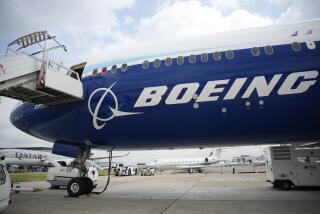Boeing Plan Would Give It Defense Edge
- Share via
SEATTLE — Boeing Co.’s proposal Thursday to acquire Rockwell International Corp.’s space and defense businesses for $3.2 billion would turn the aircraft manufacturer into the nation’s third-largest military supplier and put it in the rapidly growing field of satellite production, according to analysts and company executives.
“Boeing has been on the sidelines during the recent consolidation in the defense sector,” says John Harbison, head of aerospace practices at the consulting firm Booz Allen & Hamilton in Los Angeles. “This signals Boeing is serious about defense.”
A stronger position in the defense and space businesses could help Boeing finance the risky development of new commercial aircraft, such as the $5-billion super-jumbo jet that analysts believe is essential to Boeing if it is going to maintain its position as the world’s leading aircraft manufacturer.
With the addition of the Rockwell operations, Boeing’s space and defense revenue would make up about 33% of its $24.7 billion in estimated annual revenue--up from 25%.
“Synergy is an overused word, but in this case it applies,” says Bill Whitlow, analyst for Pacific Crest Securities in Seattle.
Rockwell is already working with Boeing on the space station and does $500 million annually in subcontracting work for Boeing.
Boeing’s current strong cash flow from civilian aircraft sales could also be a boon to Rockwell’s space division, providing the investment required to turn it into a leading player in the rapidly growing market for satellite communications.
Although Rockwell builds satellites used in global positioning systems, a technology increasingly used in automobile-navigation systems, other companies such as GM Hughes Electronics Corp. and Motorola Inc. have been more aggressive in pursuing satellite communications.
“The worldwide space market is $50 billion to $60 billion a year and that could grow substantially,” said Wolfgang Demisch, managing director at BT Securities Corp. in New York. “Boeing sees itself building a foundation for substantial growth in that area.”
Boeing has already shown an interest in space with a joint venture with a Ukrainian company to launch satellites from oil-derrick-like platforms. That venture, which already has 15 launch orders at $100 million each, now uses Russian rocket engines. But future efforts could use engines built by Rockwell, Demisch said.
Rockwell, which built the B-1B bomber and has worked on experimental fighter planes, could also help Boeing become a major player in the fighter aircraft business, a sector now dominated by Lockheed Martin Corp., McDonnell Douglas Corp. and Northrop Grumman Corp.
Boeing is currently bidding for a new-generation, low-cost fighter. Known as the Joint Attack Strike Technology, the plane would be jointly used by the Air Force, the Navy, the Marines and the British Royal Navy by the year 2008 and could generate billions of dollars in sales.
Not only would Rockwell’s bomber technology help Boeing win the bid, but its California-based operations could help Boeing win the backing of California politicians capable of swaying defense procurement decisions.
Success in this arena would return Boeing to its roots.
The company’s early growth was fueled by military aircraft production during World War II with the B-17, B-29, B-47 and B-52. The company recently reentered the business as a subcontractor on the B-1B and as a partner on the B-2 Stealth bomber. Boeing also won itself a role producing wings, the aft fuselage and the radar system for the F-22 to go into production in 1998.
Boeing has significantly revived its defense and space operations over the last five years by consolidating management, cutting employees and bidding only for contracts expected to be profitable.
(BEGIN TEXT OF INFOBOX / INFOGRAPHIC)
Flying High
Boeing Co.’s plan to buy Rockwell International Corp.’s space and defense operations for $3.2 billion is the latest mega-merger undertaken by defense giants to stay profitable after sharp cuts in post-Cold War defense spending. A look at the several of these deals--the majority of which involve California-based firms:
May 1992: Hughes Aircraft Corp. agrees to acquire the missile operations of General Dynamics Corp.
April 1994: Los Angeles-based Northrop Corp. buys Grumman Corp. for $2.2 billion.
August 1994: Lockheed Corp., then based in Calabasas, and Martin Marietta Corp. announce an agreement to merge through a stock swap valued at $10 billion.
January 1996: Northrop Grumman Corp. agrees to buy Westinghouse Electric Corp.’s defense business for $3 billion. Lockheed Martin Corp. announces plans to buy most of Loral Corp. for $9.1 billion.
August 1996: Boeing announces plans to purchase most of Seal Beach-based Rockwell’s space and defense operations for $3.2 billion.
Sources: Times and wire reports
Researched by JENNIFER OLDHAM / Los Angeles Times
MAIN NEWS: A1
More to Read
Inside the business of entertainment
The Wide Shot brings you news, analysis and insights on everything from streaming wars to production — and what it all means for the future.
You may occasionally receive promotional content from the Los Angeles Times.










